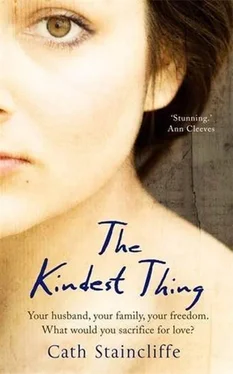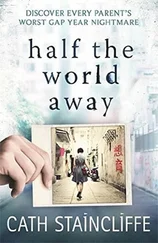‘We can’t do anything about it, Deborah. Sophie’s already made a statement. She contacted the police with her grandmother, on the twenty-fourth of June.’
I froze. Stared at her. Nine days after Neil’s death. Before I was arrested. Sophie went to the police. And then they arrested me. Oh, God. The phrase ‘turned me in’ came to mind. I imagined Veronica fuelling that grief, not from malice, for all we have clashed, but out of her genuine sorrow and outrage at my sin. At my going against God’s will and robbing her of Neil. I will lose Sophie, Adam will lose her. How do we ever come back from this? I imagined Sophie’s fierce determination, her moral certainty. The way she raises her jaw and stares you down, all conviction and courage. All that ranged against me when I’d had unspoken hopes that she would come round, see sense and deploy that passionate belief on my behalf. Tears slid down my face. I wiped them from my chin. Took a deep breath.
‘If I plead guilty, say I did it, that Neil begged me to help him – would she still have to testify?’
Ms Gleason stilled, her face became a mask. ‘Probably.’
Oh, no.
‘Deborah, you need to be very careful. I can only run a defence based on the account you give me. If you’re changing that account then the whole of our defence needs re-examining.’
‘But if I say Neil wanted to die, that I did what he wanted-’
‘No defence. That’s an admission of guilt and a mandatory life sentence.’
‘He was terminally ill.’
‘They’d lock you up, a life sentence. No alternative.’ She said this crisply, surprised I think at my naïvety or maybe at my volte-face.
All those myths of lovers torn apart by death: Dido so bereft she stabbed herself and leaped into a pyre, Hero throwing herself from her tower when Leander drowned, Orpheus, torn to pieces, his head severed from his body yet still calling for his beloved Eurydice as he floated down the river. But I’m not going anywhere. My side of the deal is to stay, to hold my resolve, to protect the children from the fallout. And I never imagined this.
‘I don’t want to stay in prison,’ I begged her. ‘I don’t want Sophie to be a witness.’
‘We can’t do anything about Sophie. I’m sorry. If you’re changing your story, if you’re admitting that you deliberately gave Neil the medication, then there’s only one defence possible and that is guilty to manslaughter due to diminished responsibility.’
‘What would that mean?’
‘We wouldn’t need to challenge the medical evidence, the post-mortem report and so on. Our argument would rest exclusively on your state of mind at the time. We would argue that you didn’t know what you were doing.’
I wanted to laugh. I’d known exactly what I was doing. ‘So, I pretend I was disturbed?’
‘No pretence. You were disturbed. The strain of caring for him, other stresses in the family…’
She means Adam.
‘… the situation drove you to behave irrationally, to break the taboos, to break the law.’
‘He asked me.’
‘And the fact that you did what he asked is proof that you were out of your mind at the time.’
I was Alice in Wonderland. ‘And if I stick to denying it all?’
She frowned and ran her hands through her hair, then looked at me directly: her eyes, a caramel brown, a freckle of gold in each iris. Her gaze stark. ‘You’ve given me two versions of events. I cannot lie to the court. I cannot represent you if I believe you intend to lie to the court. If you revert to your original statement and deny involvement I would have to advise you to get a new solicitor.’
She can’t leave me! I was as panicked as a small child. I couldn’t bear to start again with someone else. ‘I want to tell the truth. Neil asked me to be there with him, to help. We talked about it many times. I finally said yes.’
She nodded gravely. Sighed. ‘One thing you need to be aware of is that the prosecution will make a meal of your change of story. They will use the fact that you lied as a stick to beat you with, to undermine your credibility. But if we know that from the outset, we can do our best to counter it.’
‘I’m sorry.’ Maybe I should have told the truth straight away but I was hoping they’d let me go, that if I repeated the version of events that Neil and I had settled on often enough, the children would never know he had chosen to leave them and I would not risk prosecution. But it had all fallen apart.
Briony Webber calls her first witness. It is our GP, Andy Frame. I like him a lot: he was great with Neil, sensitive but not too sombre. A good bedside manner. He looks a little uncomfortable as he catches my eye on the way to the witness stand. After he has sworn to tell the truth, and confirmed his identity and his role as our GP, she asks him about Neil.
‘When did you last see Neil Draper?’
‘At the beginning of June last year.’
‘And you were sharing his care with the hospital?’
‘That’s right.’
‘How did he seem?’
‘He complained of breathlessness.’
‘Were you able to help him?’
‘I prescribed some morphine. It helps to relax the patient and is often used in the treatment of this disease in its later stages. It is also used in pain management, and in May Neil had reported a worsening of pain in his shoulders.’
‘So you had prescribed it before to Mr Draper?’
‘Yes, in May.’
I see where she is going now. Laying out how we hoarded the drugs.
‘Did you administer the medicine?’
‘No, it comes in a liquid form. Neil found that easier to take and he could use it when he felt particularly anxious.’
Or when he was planning to top himself.
‘And I’d also supplied an emergency dose in the breathing space kit.’
‘Can you explain to us what the breathing space kit is?’
‘It’s a pack supplied by the Motor Neurone Disease Association. It has instructions for use and drugs to help in an emergency – if a patient is choking, for example. The carers learn how to administer it, so they can use it while waiting for a doctor or nurse to come.’
I examine the jury. Twelve people are an awful lot to get to know. I decide to assign them nicknames or jobs to help me. I christen four of them, all on the front row. Dolly is the woman with too much makeup and a brassy hair-do. The Prof wears tweed and specs and has trouble fitting his long legs into the space. Besides him sits Callow Youth: he can’t be much older than Adam but he dresses very conventionally. I imagine he does a job where he has to conform and not frighten the customers; perhaps he goes door to door trying to get people to switch fuel suppliers. Next to him is Mousy, she’s middle-aged and has given up: shapeless clothes and lank hair. Trinny and Susannah would have a field day giving her a TV makeover. She looks tired – I wonder if she has a hard life.
Miss Webber turns Andy Frame’s attention to me. ‘You were also Deborah Shelley’s doctor?’
‘That’s right.’
‘And when did you last see Ms Shelley?’
‘In October 2008.’
‘You didn’t see her at all in 2009?’
‘No, not on her own behalf.’
I stiffen, waiting for him to mention Adam’s name. This is one of the worst things – not being able to insulate the children from it. But he continues: ‘I saw her on occasions with Neil.’
‘As her GP, what would you deduce from her lack of visits to your surgery?’
Mr Latimer stands, but before he can say anything the judge speaks. ‘No deductions, please, Counsel.’
‘Sorry, Your Honour. Dr Frame, did Deborah Shelley come to you with any health problems in 2009?’
‘No.’
Читать дальше












